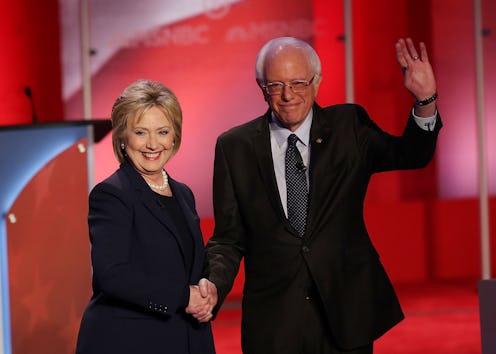News
Bernie & Hillary Debate Their Progressivism
At Thursday night's Democratic presidential debate, former Secretary of State Hillary Clinton and Sen. Bernie Sanders took to the debate stage to cover the relevant Democratic issues one last time before the New Hampshire primaries on Feb. 9. The dialogue quickly turned to a fierce debate when Sanders and Clinton were pitted against one another for the most progressive spot on the stage. The argument that was made was that one cannot occupy the statuses of both a moderate and a progressive, and at that point, the debate intensified. So who is more progressive, Sanders or Clinton? The debate shed light on the candidates' platforms.
It is helpful to define the the term progressive. According to the applicable definition, Merriam-Webster states that it is "a person advocating or implementing social reform or new, liberal ideas." At the debate's commencement, there was a conversation about who is the candidate for Wall Street. Certainly, Clinton is the one with the reputation for accepting donations from various groups on Wall Street, but does this negate her stance as a progressive candidate? She also claims to have spoken to investors and bankers, warning them that their risky deals were likely to wreck the economy. Sanders, on the other hand, only recently began working as a Democrat, having worked as an Independent senator for years, though his record on economic issues is, by Democratic standards, fairly unblemished.
At one point, Clinton argued that by Sanders' definition, President Obama and Vice President Joe Biden are not progressive. This idea stemmed from the statement Sanders made, declaring that one cannot, by American political terms, stand as both moderate and progressive. He referenced a past speech in which Clinton called herself a moderate, which — though it was likely done to illuminate Clinton's tendency to occasionally backtrack on earlier remarks — sparked a trend throughout the debate where Clinton would profess her agreement with Sanders' sentiments, while simultaneously attempting to clarify her own record and beliefs on economic progressivism.
So who is the more progressive of the two? Sanders argued that Clinton voted for the Iraq war, and that acting in favor of — or not acting on — the death penalty, previously supporting both the Keystone Pipeline and Trans-Pacific Partnership trade agreement, and claiming single-payer health care could never happen is right of the Democratic Party. Many of those criticisms are the same criticisms Sanders has toward Obama and Biden, though he did explain he believes the president is progressive:
Do I think President Obama is a progressive? Yes, I do. I disagree with him on a number of issues including the trade agreement. But, yes, I think he has done an excellent job.
Clinton believes the definition of progressivism is relative, especially since Sanders seems most notably labeled by that term, even after voting against the Brady Handgun Violence Prevention Act of 1994 a total of five times, and even after voting against Ted Kennedy's immigration reform.
Therefore, though it is clear that the two both believe in progressive policies — after all, they are the two Democratic candidates for president of the United States — perhaps the more important piece of information to remember is that, while they are two individual candidates, they are two individuals fighting the same overarching battle.
